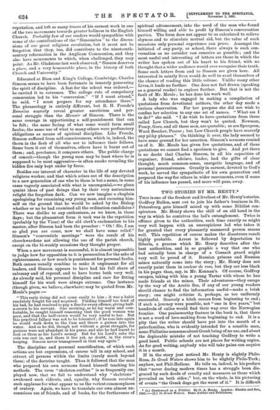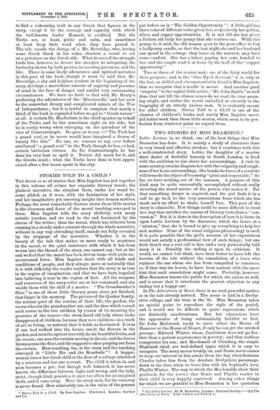TWO STORIES BY MR. HENTY.*
THIS is one of the freshest and liveliest of Mr. Henty's stories. Godfrey Bullen, sent out to join his father's business in St. Petersburg, gets himself mixed up with some Nihilist con- spirators. Mr. Henty shows the skill of an old hand in the way in which he contrives the lad's entanglement. Twice is offence given to the authorities, each time exactly as might very well happen with an unsuspicious lad who takes it for granted that every pleasantly mannered person means well. This repetition of course makes the disastrous result highly probable. Arrest is followed by deportation to Siberia, a process which Mr. Henty describes after the best authorities, and in so graphic a way that one who had actually been in charge of a Cossack guard might very well be proud of it. Russian prisons and Russian mines naturally come into the story ; Mr. Henty does not exactly paint them in couleur de rose, but they are less black in his pages than, say, in Mr. Kennan's. Of course, Godfrey escapes, taking with him a young Tartar with whom he has made friends at the mines. Their adventures—they escape by the way of the Arctic Sea, if any of our young readers should chance to find the information useful—make a brisk story; one might criticise it, perhaps, as too uniformly successful. Scarcely a hitch occurs from beginning to end ; if such a journey were possible, not " one in five years," but hundreds of exiles would find their way over the Norwegian frontier. One praiseworthy feature in the book is, that there is not a word of love-making from beginning to end. It is a pity that the writer should have put into the month of a paterfamilias, who is evidently intended for a sensible man, some Philistine nonsense about Greek being of no use, and about the deplorable mistake of not teaching Godfrey to write a good hand. Public schools are not places for writing copies. As for good writing, anybody who will take pains can acquire it in a month.
If in the story just noticed Mr. Henty is slightly Philo. Russ, In Greek Waters shows him to be slightly Philo-Turk ; anyhow, not Phil-Hellene. He tells us, indeed, in his preface that "never during modern times has a struggle been dis- graced by such deeds of cruelty and massacre as those which prevailed on both sides ;" but, on the whole, in his picturing of events " the Greek dogs get the worst of it." It is difficult • (1.) Condemned as a Nihilist. By G. A. Booty. London: Blaokie and Bon, 1893.—(2.) In (}reek Waters. Same Author and Publishers.
to find a redeeming trait in any Greek that figures in the story, except it be the courage and capacity with which the well-known leader Kanaris is credited. But the Turks are, at least, polite and calm, and sometimes at least keep their word when they have passed it. The tale recods the doings of a Mr. Beveridge, who, having some Greek blood in his veins, charters a vessel to act as a privateer on the Greek side. What he sees of the struggle leads him, however, to devote his energies to mitigating the barbarity shown by both parties, in rescuing prisoners, and the like. There is some lively adventures and spirited narrative in this part of the book, though it must be said that Mr. Beveridge, a shy and helpless student in the beginning of the story, develops a marvellous amount of sagacity and presence of mind in the face of danger and amidst very embarassing circumstances. We have no fault to find with Mr. Henty's preferring the adventures of the Misericordia ' and her crew to the somewhat dreary and complicated annals of the War of Independence ; but it is lawful to complain that nearly a third of the book is expended before we get to " Greek waters " at all. A certain Dr. Macfarlane is the chief speaker on behalf of the Turks, and he has sometimes right on his side ; but he is surely wrong when enlarging on the splendour of the view of Constantinople. He goes on to say :—" The Turk has a grand soul, or he never would have imagined a dream of beauty like this." No one, we venture to say, ever before attributed " a grand soul" to the Turk, though he has, or had, certain barbarian virtues. As for Constantinople, he has done his very best to spoil it. Nature did much for it, and the Greeks much ; what the Turks have done is best appre- ciated after a few hours spent in the city.























































 Previous page
Previous page